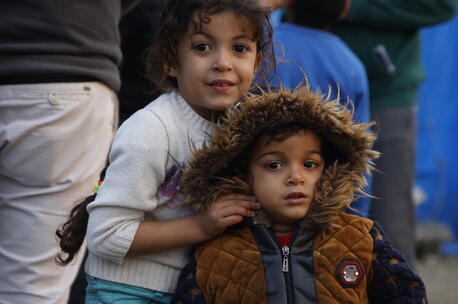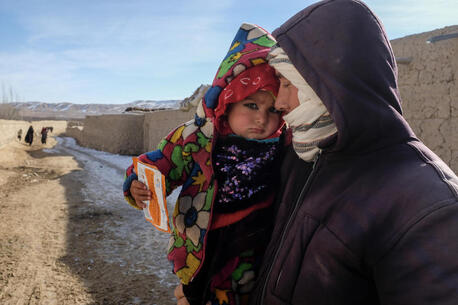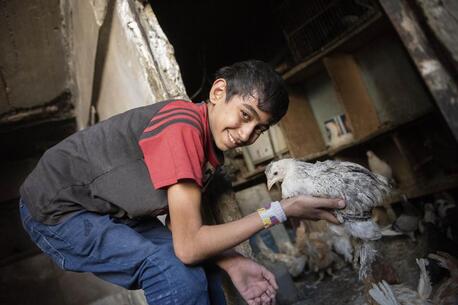A New Threat in Syria: Winter
Freezing nights in winter are common in the U.S. That’s not a surprise. It turns out winter nights are also freezing in Syria. The days are often wet or snowy there and in other parts of the Middle East, where more than one million children are affected by Syria’s fighting. Now, in addition to facing danger, these children need hats and gloves, blankets and winter clothing. They need warm places to sleep and access to clean water, health care, and cooking supplies. Respiratory infections and other winter illnesses are a particular worry, since many of these children are especially vulnerable to getting sick due to the stress they have endured.
Freezing nights in winter are common in the U.S. That’s not a surprise.
It turns out winter nights are also freezing in Syria. The days are often wet or snowy there and in other parts of the Middle East, where more than one million children are affected by Syria’s fighting. Now, in addition to facing danger, these children need hats and gloves, blankets and winter clothing. They need warm places to sleep and access to clean water, health care, and cooking supplies. Respiratory infections and other winter illnesses are a particular worry, since many of these children are especially vulnerable to getting sick due to the stress they have endured.
 At the Za’atari refugee camp in Jordan, where thousands of Syrian refugees are sheltering, the heat of summer has given way to wind, rain and mud. Once winter fully takes hold, temperatures will drop to zero and below. ©UNICEF/Jordan-2012/Salah Malkawi
Inside Syria, half a million children are displaced, and another 200,000 Syrian children are in other countries in the area, including Jordan, Turkey, Lebanon, and Iraq.
UNICEF has a winter strategy to get supplies and support to 647,000 children by working with partners in Syria and throughout the region. Now, money is needed to cover the costs of this operation. Some donors have stepped up, but a big funding gap remains. An additional $75 million is required to reach affected children.
Baby blankets cost $7.06. Long-sleeved bodysuits are $5.65. A hygiene set for a family is $20.
The winter strategy is designed for each country and includes:
At the Za’atari refugee camp in Jordan, where thousands of Syrian refugees are sheltering, the heat of summer has given way to wind, rain and mud. Once winter fully takes hold, temperatures will drop to zero and below. ©UNICEF/Jordan-2012/Salah Malkawi
Inside Syria, half a million children are displaced, and another 200,000 Syrian children are in other countries in the area, including Jordan, Turkey, Lebanon, and Iraq.
UNICEF has a winter strategy to get supplies and support to 647,000 children by working with partners in Syria and throughout the region. Now, money is needed to cover the costs of this operation. Some donors have stepped up, but a big funding gap remains. An additional $75 million is required to reach affected children.
Baby blankets cost $7.06. Long-sleeved bodysuits are $5.65. A hygiene set for a family is $20.
The winter strategy is designed for each country and includes:
 At the Za’atari refugee camp in Jordan, where thousands of Syrian refugees are sheltering, the heat of summer has given way to wind, rain and mud. Once winter fully takes hold, temperatures will drop to zero and below. ©UNICEF/Jordan-2012/Salah Malkawi
At the Za’atari refugee camp in Jordan, where thousands of Syrian refugees are sheltering, the heat of summer has given way to wind, rain and mud. Once winter fully takes hold, temperatures will drop to zero and below. ©UNICEF/Jordan-2012/Salah Malkawi- Installing gas or solar-powered water boilers, gas tanks, and hot water pipelines ( in Jordan, as one example, 155,000 people are expected to benefit).
- Conducting a measles campaign at the end of November and early in December using 1.1 million doses of vaccine that UNICEF has supplied.
- Delivering winter packages that include clothing, blankets, sleeping mats for insulation, plastic sheets to protect against wind and rain, hygiene kits, and cooking sets.
- Enrolling children in schools, delivering teaching magazines and other materials, and conducting child protection workshops. (In Iraq, 250 new children were registered at a school in a refugee camp, as the result of a UNICEF-supported enrollment drive.)


